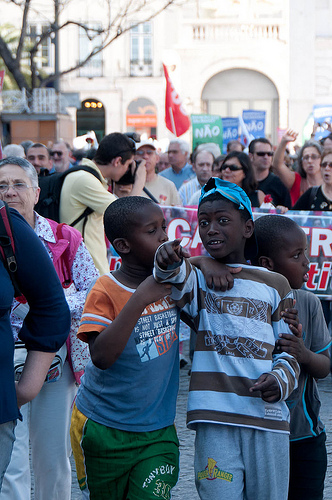Going to School Without Breakfast in Portugal

Going to school without eating breakfast has become a normal part of daily life for thousands of children in Portugal, whose growing vocabulary now includes the word 'crisis'.
Influenced by what they hear from their parents and see on television, children have started to discuss the situation in this southern European country, remember when things were easier, and even criticise political leaders.
In hundreds of public schools, children from low-income families hover around the food counter in the dining area, without buying anything. Education authorities cannot afford to offer more than a modest breakfast, and only for those in greatest need, because their budgets have been slashed.
The economic crisis rocking Portugal and many of its European neighbours 'impacts on the lives of children in this country, many of whom have crossed the line into the at-risk category,' Ana Filgueiras, the head of Cidadãos do Mundo (CM - Citizens of the World), a local NGO, told IPS.
The activist fears that the drastic funding cuts for NGOs decided by the right-wing government of Prime Minister Pedro Passos Coelho 'will exacerbate the situation, especially for the poorest of the poor.
'It is not the state, but NGOs, that develop the most effective plans for protecting children,' said Filgueiras, who fought against Portugal’s 1926-1974 dictatorship and lived for a number of years in Brazil, where she denounced the murders of street children by death squads in the 1970s and 1980s.
The children of undocumented immigrants 'are the most vulnerable, since they are denied access to the national health service, which can create extremely serious situations,' she said.
To alleviate the problems experienced by vulnerable children, 'we should consider the example of Brazil, where direct cash transfers to poor families benefit a total of 35 million children,' the activist said.
'Portugal is light years behind Brazil, which in recent years has made much greater social progress. Here we have state institutions, but they do not implement policies of social inclusion,' she said.
Filgueiras' criticisms are corroborated by the United Nations Children's Fund's (UNICEF) report on countries of the Organisation for Economic Cooperation and Development (OECD), a group of 34 states that includes all of the world’s rich nations.
The report on 'Measuring Child Poverty' launched on Tuesday May 29 indicates that over 27 percent of children under 16 in Portugal live in conditions of deprivation, ranking the country fifth-worst among OECD states, ahead of only Latvia, Hungary, Bulgaria and Romania.
The report, based on data from 2009, defines minimum acceptable living conditions for children which include three meals a day, a quiet place to do homework, internet connection, at least two pairs of shoes and the opportunity to celebrate special occasions like birthdays.
Among Portuguese children living in single parent families, an especially at-risk group, 46.5 percent are deprived of two or more items deemed essential for their welfare. In Spain, by contrast, the figure is only 15.3 percent. Even worse off are children whose parents are unemployed, among whom the deprivation rate is 73.6 percent in Portugal.
UNICEF also reports that 14.7 percent of Portuguese children under 16 live in relative poverty, that is, in households with incomes (per adult) of less than 50 percent of the national median income of 520 dollars a month.
The document compares Portugal with the Czech Republic, both countries with annual per capita incomes of about 32,500 dollars, and reports a devastating difference: in Portugal the deprivation rate among children is three times higher than in the Czech Republic.
In addition, 'social support measures in Portugal are not very effective, or at least are not reaching the children,' said Madalena Marçal Grilo, UNICEF executive director for Portugal, on Tuesday as she emphasised the impact of deprivation in childhood.
The 2009 indicators are the latest available internationally comparable data, which means there are no figures on 'what is happening to child poverty as a result of the economic downturn of the last three years,' the UNICEF report says.
The severe austerity measures that have led, for instance, to cutting social support even for the lowest-income households, now mean that these families must use their savings or sell what few belongings they own in order to cushion the impact of the crisis.
Once these resources are exhausted, child deprivation will probably get worse, say the report's authors: 'Although currently thought to be stable, the child poverty rate is predicted to begin rising again in 2013.'
In other words, 'the worst is yet to come,' the UNICEF document predicts.
The austerity measures imposed by Passos Coelho include substantial tax hikes, price increases for essential goods, elimination of some public holidays, longer workdays, and drastic wage cuts, except for executives and managers, many of whom have been awarded pay raises.
Since the conservative government took office one year ago, 80 percent of the population has lost one-fifth of its purchasing power, and unemployment has grown from 11 to 16 percent.
With many people unable to meet their mortgage payments, some 4,000 families a month are being evicted because their homes have been repossessed by banks — a situation that hits children particularly hard.
© Inter Press Service (2012) — All Rights Reserved. Original source: Inter Press Service

